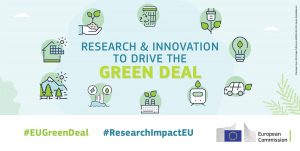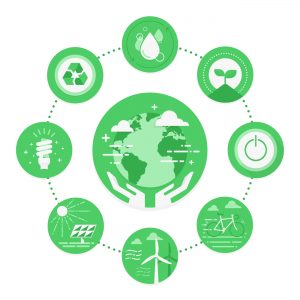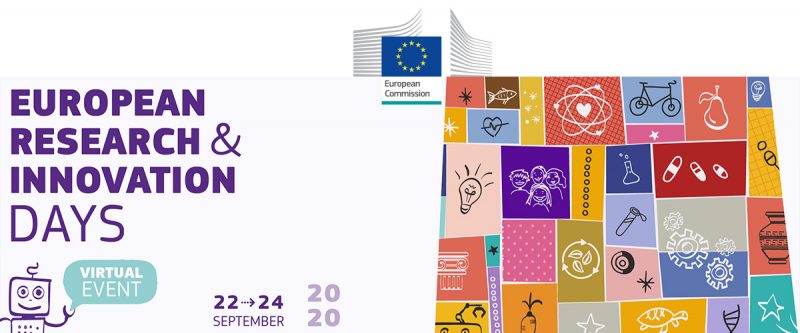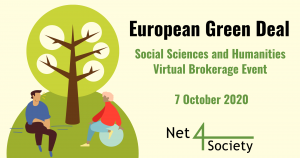The opening of the call for proposals in the special Horizon 2020 call dedicated to the European Green Deal is expected in the second half of September 2020. As it was written on PolSCA website – on the occasion of the announcement of the call in June (link) – its purpose is primarily to support fair and sustainable social transformation through research. In addition to technological development and demonstration projects the EU Green Deal call (GDC) is aimed at development of new ways to engage civil society and empowerment of citizens in the ‘green’ transition, and should therefore be of interest to social sciences and humanities researchers. In the light of this, we encourage you to read the short description of selected Green Deal Call topics and the expected results to be achieved by the projects financed under H2020. We also inform about events related to the GDC, including dedicated brokerage meetings organized by Net4Society or The Enterprise Europe Network, as well as about special sessions during EU Research and Innovation Days, which will take place online on 22-24 September 2020.
From the perspective of social sciences and humanities’ researchers particular attention should be paid to AREA 10 on Empowering citizens for the transition towards a climate neutral, sustainable Europe. In this area, a main emphasis is placed on research concerning behavioral, social and cultural changes in the context of green transformation, as well as on concrete actions to empower citizens as the main actors of change. This area covers the following three topics:
10.1 European capacities for citizen deliberation and participation for the Green Deal
Under Topic 10.1 projects aiming at creating transnational networks of experts, researchers, practitioners and civil society organizations specialized on deliberative democracy and civic participation across Europe, including professionals in the field of public engagement, will be funded. Experts on gender equality and climate justice should also be included. The task of the networks is to share good practices, tools and resources and implement participatory processes on priority issues in order to implement the Green Deal, both at the level of local communities and on a larger scale. It should be build on already existing tools, notably stemming from EU-funded projects such as the RRI Tools platform.
It is expected that the results of the projects will contribute to:
- strengthen the sense of responsibility and engagement through citizen deliberation and participation of citizens from all over Europe;
- enhanced involvement of citizens in the implementation of the European Green Deal and of the future Horizon Europe missions;
- stronger trust in policy and science institutions among citizens on Green Deal issues;
- long-term commitment of various social groups and their support for the priorities of the Green Deal and the proposed models of transformation.

10.2 Behavioural, social and cultural change for the Green Deal
Successful proposal under Topic 10.2 should include a transdisciplinary approach to behavior change that takes into account system dynamics and integrates historical, cultural, social, economic and psychological perspectives. Therefore, disciplines such as anthropology, cultural psychology, cultural studies, semiotics and sociology, as well as gender studies and inter-sectional studies should be taken into consideration in order to pay due attention to cultural change as one of the key preconditions for behavior change. Inequalities related to climate change and the socio-ecological transition should also be considered, as well as the role of science communication, journalism and the media. It is also important to present broader institutional conditions (legal, financial, economic), which will allow for the formulation of appropriate political recommendations and regulations in terms of implementing ‘green’ changes.
Particular emphasis in submitted applications should be put on vulnerable and marginalized people, minorities and various age groups, including both youth and elder generation, as well as both urban and rural areas. Gender issues will also be of great importance. Projects may also concern changes in the workplace, as well as changes in the public sector, i.e. the activities of collective entities, enterprises, corporations, public services and other organizations. Consortia are expected to provide a set of measurable indicators to measure the impact of their research as well as contribute to one or several of the Sustainable Development Goals (SDGs).
It is expected that the results of the projects will contribute to:
- provide structured, transdisciplinary expertise;
- propose a more nuanced view of mindset and behavioural change mechanisms through the lens of transdisciplinary research that integrates historical, cultural, societal, economic and psychological perspectives;
- create new strategies to induce long-term changes in behavior and effective strategies for long-term commitment, trust and acceptance from people, communities and organizations;
- develop recommendations which are taken into account the differences between EU regions and social groups e.g. in terms of urgency perceptions;
- propose a bottom-up approach to manage, inter alia, the uncertainty derived from climate change;
- increase societal resilience against climate change and environmental crises.

The aim of topic 10.3 is to empower and directly involve citizens in realizing their personal impact on climate and the environment thus leading to a change in their behaviour, reducing their personal carbon footprint and taking action at societal level towards a more sustainable future. Shifting citizen and consumer behavior towards more sustainable patterns may become reality through education, awareness raising, citizen science, observation and monitoring of their environmental impacts, and civic involvement. Direct involvement of citizens and communities in contributing to climate action and environmental protection is essential, thus encouraging them to change their own behavior, reduce their carbon and environmental footprint and take action at individual and collective levels. This is to lead to a more sustainable lifestyle and relationship with the environment by promoting biodiversity protection, sustainable energy consumption, waste management, etc.
A strong emphasis is placed on strengthening the environmental awareness of the young generation through education and other forms of youth involvement. Pupils and students have the potential to become climate action and environmental ambassadors by sharing their knowledge, experience and commitment with their families, local communities and public and private decision-makers.
Projects should be related to citizen science, which should be understood broadly: from raising public knowledge about science, encouraging citizens to participate in the scientific process through observation, collecting and processing data, to setting a science agenda and co-creating / implementing science-related policies. It may also include publication of results and teaching science.
The submitted applications should be coherent with the objectives of the European Green Deal and of the European Climate Pact. The proposed actions will build on existing initiatives and practices that demonstrate innovative teaching and learning methods and how to engage the wider community in the changes needed for a successful and just transition (e.g. the European Ocean Literacy platform or The Citizen Science Platform).
Proposals under this topic should cover one of the following two areas:
10.3.1 Enabling citizens to act on climate change and for sustainable development through education
Applications submitted in this area should propose initiatives related to the acquisition of skills, knowledge, shaping the attitudes of citizens, in particular young people, in the field of climate change and sustainable development. Actions shall be based on the best available research to develop key competences for lifelong learning, especially in the areas of life sciences, technology, mathematics, as well as social competences, entrepreneurship and citizenship. The participation of life scientists, technology specialists, civic science specialists, and social sciences and humanities researchers is necessary to develop the above-mentioned initiatives.
It is expected that the results of the projects will contribute to:
- the development of a multidisciplinary European competence framework in the context of lifelong learning with the aim of developing and assessing the knowledge, skills and attitudes of citizens, especially young people, in the field of climate change, sustainable development and environmental protection;
- serve as a reference tool for Member States, stakeholders and NGOs to help citizens become actors in the green transformation of society;
- develop specific educational programs, curricula, training and exchange of good practice, and a consultation process involving schools, universities, municipalities, public authorities in cooperation with the private sector, teachers, students, parents and the wider community.
10.3.2 Enabling citizens to act on climate change through better monitoring and observing of the environment and their environmental impacts
Initiatives in this area are aimed at involving citizens in climate and environmental issues, such as biodiversity, pollution of marine and fresh waters, and healthy food. They will focus on the active participation of citizens primarily through individual environmental observation opportunities. Projects should be carried out on a broad scale, in cooperation with businesses, civil society organizations and public authorities, to ensure that these actions will lead to examples on how to engage the wider community in the effective behavioural changes needed for a successful and just transition. A key element of this area is awareness-raising, engagement and empowerment of citizens and consumers through specific tools to monitor their environmental impact, gather information enabling them to change their behavior, and reduce their personal carbon and environmental footprint as user and consumer. Projects should include the development and / or improvement of devices (low cost sensors, consumer applications, etc.). Special attention should be paid to the promotion of gender equality and the deconstruction of gender stereotypes.
It is expected that the results of the projects will contribute to:
- develop citizen science initiatives to engage citizens in actively collecting environmental and socioeconomic data using individual new or improved devices (such as wearable sensors, trusted user-friendly app with robust carbon footprint calculations, marine and freshwater litter observation, etc.);
- provide personalized information to citizens and consumers on their environmental impact;
- better environmental monitoring (land, sea, air, etc.);
- trigger changes in consumer behavior towards more sustainable patterns of reducing their carbon and environmental footprint, changing their consumption and lifestyle choices to achieve the goals of a climate neutral, sustainable Europe through specific and targeted advice.

R&I Days 2020 – sessions dedicated to Green Deal Call

To find out more about the GDC topics, register for the European Research and Innovation Days (# RiDaysEU2020) which will take place online on 22-24 September 2020. The program includes 11 sessions devoted to the EU Green Deal Call, as well as a special Info Day for scientists / organizations planning to submit applications in this call. Details, including a link to register for the event, available on the European Commission website.
Online brokerage events: ‘SSH in the Green Deal Call’ and ‘Horizon 2020 Virtual Brokerage Event on the Green Deal Call’

All social sciences and humanities researchers interested in submitting a proposal under the GDC are invited to take part in the virtual brokerage meeting Social sciences and humanities in Green Deal Call, organized on 27th October 2020 by Net4Society. This event will be focused on the Green Deal Call topics that have been identified as relevant for representatives of social sciences and humanities disciplines.
Moreover, on 13th October 2020 The Enterprise Europe Network is organizing a one-day Horizon 2020 Virtual Brokerage Event on the Green Deal Call. The program includes presentations of the European Commission and National Contact Points in all areas of the Green Deal and presentations of research ideas. It should be added that both brokerage events are aimed at expanding the international network of contacts, establishing cooperation with foreign partners, as well as consulting ideas with experts. Registration for the event only until 9th October!
Based on these materials, it is worth considering participation in the Green Deal Call and begin preparations for submitting an application, including the search for international partners. The PolSCA office cordially invites Polish researchers – in particular representatives of institutes of the Polish Academy of Sciences – interested in participating in the call to contact us!
We encourage you to follow the activity of the PolSCA Office on our website, as well as on the Facebook profile. If you want to receive similar information and to be regularly updated via PolSCA Office, subscribe to our newsletter!
Published: 2020-09-03, J. Kramarczyk
Translated: 2020-10-16, J. Kramarczyk
Visuals: @Freepik.com



